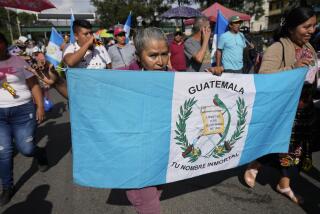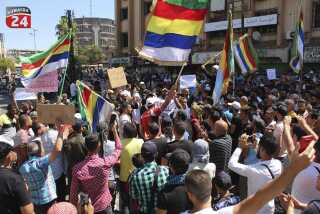Violence, anger grow in Yemen
- Share via
Reporting from Sana, Yemen — Thousands of rival demonstrators protesting for and against Yemen’s president clashed in the capital of Sana on Thursday in a sprawl of burning tires, hurled chunks of concrete and fistfights that marked the seventh straight day of unrest across the nation.
The increasingly violent protests are putting fresh pressure on longtime Yemeni President Ali Abdullah Saleh, who has made a number of rebuffed concessions, and on leaders of Yemen’s national opposition coalition, who have been advocating for reforms within Saleh’s government. The coalition has so far stopped short of calling for the president’s resignation, but some members worry that tactic doesn’t reflect growing popular anger.
“Ultimately, we must respond to the people’s demands,” said Mohammed Sabri, a leading member of Yemen’s opposition coalition, Joint Meeting Parties. “The Yemeni people will decide whether reforms can be achieved through this regime or whether a new government is necessary.”
Opposition leaders are concerned that over the course of Saleh’s 32-year rule, he has woven a formidably complex web of allies and family members in key positions in the government and among the tribes that rule Yemen. Removing him from power could set off a domino effect that could lead to long-term violence in one of the poorest and most volatile countries in the Arab world.
Some anti-government protesters said such claims were scare tactics to keep people from protesting.
“They say Yemen will collapse without Saleh, but we don’t believe it. We are done waiting for reforms. We need a new president now. A new parliament, new elections. We will be stronger with real freedom,” said protester Basem Madhehagi, standing amid homemade signs and banners crafted from bed sheets.
Pro-government protesters staged several slightly slicker rallies in Sana, carrying hundreds of brand-new Yemeni flags and professionally printed, glossy placards bearing Saleh’s smiling face. Many supporters credited Saleh for bringing peace and unity to Yemen despite an array of internal threats and for making steps toward reform.
“Yemen is not like Egypt or Tunisia. We have many internal enemies,” said Yasir Refaee, a pro-government protester at a morning rally in front of Sana University. “We need a strong leader like Saleh to face our problems, or we will turn into Somalia.”
Saleh’s government has been unable to stem rising frustration, especially among the youth, over unemployment, poverty and corruption. The government also faces sporadic conflicts with Houthi rebels in the north of the country, a separatist movement in the south and a pivotal battle with Al Qaeda of the Arabian Peninsula, which has established a stronghold in Yemen’s eastern mountains.
On Feb. 2, Saleh, who has a long history of playing his enemies off one another to retain power, has vowed he would not run again when his term ends in 2013 or manufacture his son’s ascendancy to the presidency. He also promised to begin talks with the opposition coalition about reform and anti-corruption measures within his government.
Other pro-government supporters were more circumspect.
“Honestly, it is not that we support the president. It is that we support the country. We aren’t pro-Saleh, we’re pro-stability,” said Bilal Qutibi, a pro-government protester. “Reforming this government is better than tearing it down.”
Roughly 2,000 pro- and anti-government protesters faced off on Sana’s Al Rabat Street at midday Thursday, throwing stones and pieces of concrete and occasionally rushing each other in mass offensives, which one protester compared with the 13th century Scottish battle tactics in the film “Braveheart.”
Anti-government protesters claim the pro-Saleh demonstrators have been paid by the government or transported to Sana by pro-Saleh tribal sheiks. Pro-government protest leaders deny the claim.
Young men on both sides of the burning-tire barricade on Al Rabat Street wore Yemeni flags as headbands and capes, and some, seasoned by the last few days of protests, wore helmets and carried cardboard shields. An estimated two dozen people were injured. After more than an hour, the police arrived, firing warning shots into the air until the crowds dispersed.
Edwards is a special correspondent. Times staff writer Jeffrey Fleishman in Cairo contributed to this report.
More to Read
Sign up for Essential California
The most important California stories and recommendations in your inbox every morning.
You may occasionally receive promotional content from the Los Angeles Times.










